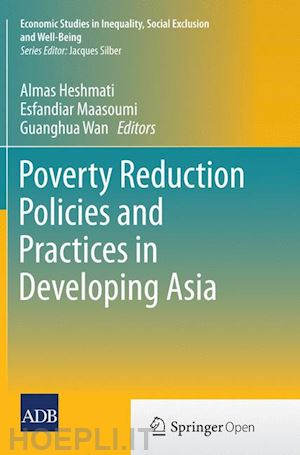
Questo prodotto usufruisce delle SPEDIZIONI GRATIS
selezionando l'opzione Corriere Veloce in fase di ordine.
Pagabile anche con Carta della cultura giovani e del merito, 18App Bonus Cultura e Carta del Docente
This book looks at the major policy challenges facing developing Asia and how the region sustains rapid economic growth to reduce multidimensional poverty through socially inclusive and environmentally sustainable measures. Asia is facing many challenges arising from population growth, rapid urbanization, provision of services, climate change and the need to redress declining growth after the global financial crisis. This book examines poverty and related issues and aims to advance the development of new tools and measurement of multidimensional poverty and poverty reduction policy analysis. The book covers a wide range of issues, including determinants and causes of poverty and its changes; consequences and impacts of poverty on human capital formation, growth and consumption; assessment of poverty strategies and policies; the role of government, NGOs and other institutions in poverty reduction; rural-urban migration and poverty; vulnerability to poverty; breakdown of poverty intochronic and transitory components; and a comparative study on poverty issues in Asia and other regions. The book will appeal to all those interested in economic development, resources, policies and economic welfare and growth.
Acknowledgments.- Chapter 1: Introduction and Summary to Poverty Reduction Policies and Practices in Developing Asia.- Part One: Poverty Alleviation with Microfinance.- Chapter 2: Poverty Alleviation with Microfinance: Bangladesh Evidence.- Chapter 3: Does Microcredit Help the Poor and Financially Marginalized Communities? Experience of Pakistan.- Part Two: Climate Change, Disaster Management and Poverty Reduction.- Chapter 4: Climate Change, Agricultural Production and Poverty in India.- Part Three: Urban Poverty Reduction Policies.- Chapter 5: Urban Poverty in Developing Asia—Dichotomy between the Income and Non-Income Dimensions: Are We Not Grossly Underestimating Its Incidence?.- Chapter 6: Housing Poverty and Inequality in Urban India.- Part Four: Rural Poverty Reduction Policies.- Chapter 7: Evaluation of the Policy of Crop Diversification as a Strategy for Reduction of Rural Poverty in India.- Chapter 8: Conflict and Livelihood Decisions in the Chittagong Hill Tracts of Bangladesh.- Part Five: Dimensions of Poverty and its Reductions.- Chapter 9: Decomposing Spatial Inequality in Sri Lanka: A Quantile Regression Approach.- Chapter 10: Non-Income Dimensions, Prevalence, Depth and Severity of Poverty: Spatial Estimation with Household Level Data in India.- Chapter 11: Is Poverty Comparable Across Varying Size of Population Among Indian States?.- Part Six: Sustainability in Poverty Reduction.- Chapter 12: The Significance of Foreign Labour Migration and Land for Poverty Reduction in Nepal.- Chapter 13: Does Poverty Alone Keep Children Out of School? The Case of Children under Kinship Care in the Philippines.- Part Seven: Alleviation of Poverty in Asia and the Pacific.- Chapter 14: Economic Class and Labour Market Segregation: Poor and Middle Class Workers in Developing Asia and the Pacific.- Chapter 15: Foreign Direct Investment and the Poverty Reduction Nexus in Southeast Asia.
ALMAS HESHMATI is Professor of Economics at the Sogang University. He held similar positions at Korea University, Seoul National University and University of Kurdistan Hawler. He was a Research Fellow at the World Institute for Development Economics Research, United Nations University, and Associate Professor at Stockholm School of Economics. He has a Ph.D. degree from the University of Gothenburg (1994). His research interests include applied microeconomics, globalization, welfare economics, industrial economics, development strategy and performance analysis with application to manufacturing and services.
ESFANDIAR MAASOUMI is the Arts and Sciences Distinguished Professor of Economics at Emory University. He is author and coauthor of more than 100 articles, reviews, and books, including special issues of Journal of Econometrics and Econometric Reviews. He has written theoretical and empirical papers in both economics and econometrics, and consults on law and economics issues.Current Research Interests include: nonlinear time series, information theory, tests for stochastic dominance, measures of volatility, measures of welfare and mobility. Dr. Maasoumi received Ph.D. (1977) degrees from the London School of Economics. He is the Editor of Econometric Reviews.
GUANGHUA WAN is Principal Economist at the Economics and Research Department of the Asian Development Bank. Previously, he was Senior Economist in the United Nations and taught in a number of Universities in Australia and People’s Republic of China (PRC). Trained in development economics and econometrics, Dr. Wan is an award-wining scholar on the Chinese economy and an expert on Asia, with an outstanding publication record of more than 100 professional articles and a dozen of books including two by Oxford University Press. An honorary professor of over ten top institutions in PRC including Fudan and Zhejiang Universities.











Il sito utilizza cookie ed altri strumenti di tracciamento che raccolgono informazioni dal dispositivo dell’utente. Oltre ai cookie tecnici ed analitici aggregati, strettamente necessari per il funzionamento di questo sito web, previo consenso dell’utente possono essere installati cookie di profilazione e marketing e cookie dei social media. Cliccando su “Accetto tutti i cookie” saranno attivate tutte le categorie di cookie. Per accettare solo deterninate categorie di cookie, cliccare invece su “Impostazioni cookie”. Chiudendo il banner o continuando a navigare saranno installati solo cookie tecnici. Per maggiori dettagli, consultare la Cookie Policy.